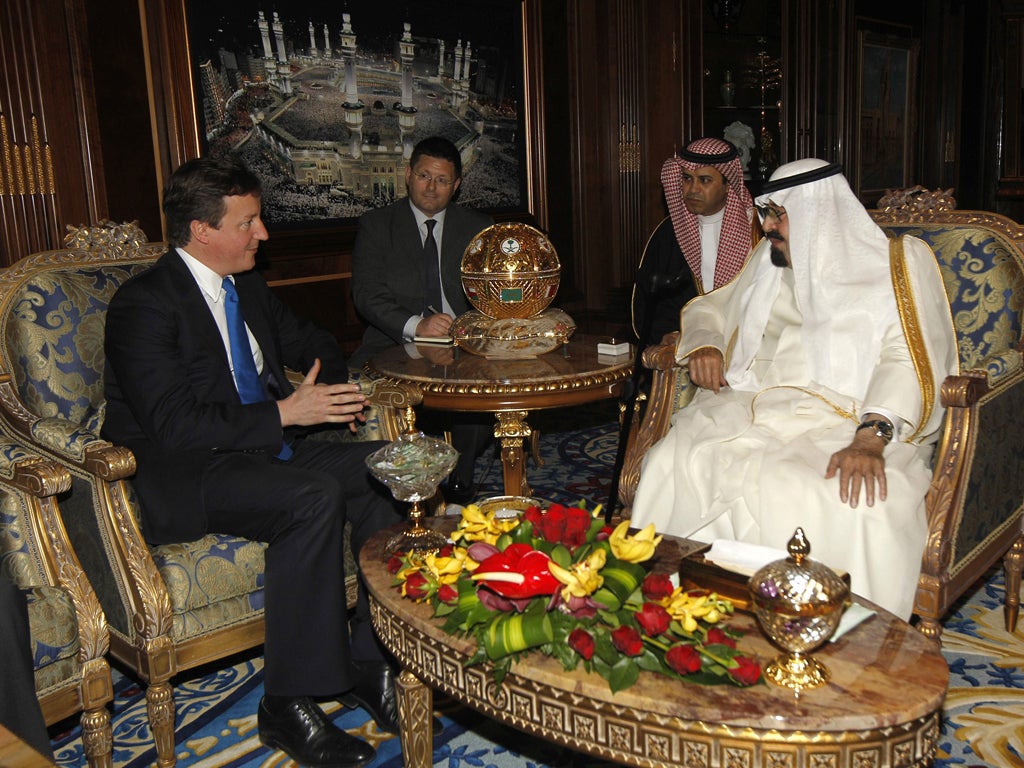Cameron urges Saudis to turn on the oil taps
Pipeline could be vital to the world economy if Iran blockades the Strait of Hormuz

Your support helps us to tell the story
From reproductive rights to climate change to Big Tech, The Independent is on the ground when the story is developing. Whether it's investigating the financials of Elon Musk's pro-Trump PAC or producing our latest documentary, 'The A Word', which shines a light on the American women fighting for reproductive rights, we know how important it is to parse out the facts from the messaging.
At such a critical moment in US history, we need reporters on the ground. Your donation allows us to keep sending journalists to speak to both sides of the story.
The Independent is trusted by Americans across the entire political spectrum. And unlike many other quality news outlets, we choose not to lock Americans out of our reporting and analysis with paywalls. We believe quality journalism should be available to everyone, paid for by those who can afford it.
Your support makes all the difference.David Cameron has called on the King of Saudi Arabia to step up his country's oil production in the face of Iranian threats to block off the sea corridor through which one sixth of the world's oil supplies pass.
In private talks with King Abdullah during an official visit to the Kingdom yesterday, Mr Cameron expressed Britain's fears that a blockade could destabilise the world economy.
Iran has threatened to block the Strait of Hormuz, which links the Persian Gulf with international ports, if the EU imposes sanctions on its crude exports. About 15.5 million barrels of oil pass through the Strait every day.
Saudi oil would continue flow through the kingdom's East-West Pipeline, which can carry as much as 5 million barrels a day. Mr Cameron is thought to have asked that Saudi Arabia increase production regardless of any blockade, to guarantee oil supplies to countries which rely on Iranian oil – which would be effected by EU sanctions.
Some of the most economically vulnerable EU countries, including Greece, Spain and Italy, are among the largest importers of Iranian oil and this has delayed the imposition of sanctions.
Downing Street refused to comment last night but one source said: "It is in no one's interest for the price of oil to be destabilised." Mr Cameron said: "It is in the interests of the whole world that those straits are open and, if there was any threat to close them, I am sure the whole world would come together and make sure they stayed open."
The United States has warned leaders of the regime in Iran through back-channels that any attempt to close down the Strait of Hormuz would not go unanswered. "That's another red line for us and ... we will respond to them," the US Secretary of Defence, Leon Panetta, said this week.
The two leaders also discussed the situation in Syria, and Mr Cameron later indicated that Britain would be prepared to lead UN action against the country – in the face of Russian opposition.
In an interview he said: "We stand ready as a permanent member of the UN Security Council to take a fresh resolution to that Council, based on what the Arab League is doing and saying, and daring others that if they want to veto that resolution to try to explain why they are willing to stand by and watch such appalling bloodshed by someone who has turned into such an appalling dictator."
Hundreds of protesters took to the streets yesterday in eastern Saudi Arabia after a Shiite youth was killed in a clash with security forces.
Despite calls for Mr Cameron to be "completely frank and firm" about human rights concerns in Saudi Arabia, he is believed to be more concerned about securing Saudi support for sanctions.
He is also keen to boost trade with the Kingdom. Saudi Arabia is Britain's biggest trading partner in the Middle East with bilateral trade worth £15bn a year.
Tim Hancock, the UK campaigns director for Amnesty International, said: "There is shocking disrespect for basic human rights in Saudi Arabia and David Cameron should be completely frank and firm with King Abdullah about this.
"If Mr Cameron is discussing arms deals on this trip he must ensure that they will be subject to rigorous controls."
Saudi-British trade in numbers
£2.5bn: Value of British exports to Saudi Arabia, equivalent to just 1.1% of the total, making it only our 24th biggest trading partner (smaller than Poland or Turkey).
27%: Proportion of UK exports of "armoured fighting vehicles" sold to Saudi Arabia in 2009, making it the second biggest buyer of UK arms.
72: The number of Eurofighter Typhoon fighter jets bought by Saudi Arabia in a multibillion-pound deal with BAE Systems. Reportedly the British firm is negotiating to secure more sales.
£62bn: The value of Saudi investment in the UK each year.
Join our commenting forum
Join thought-provoking conversations, follow other Independent readers and see their replies
Comments